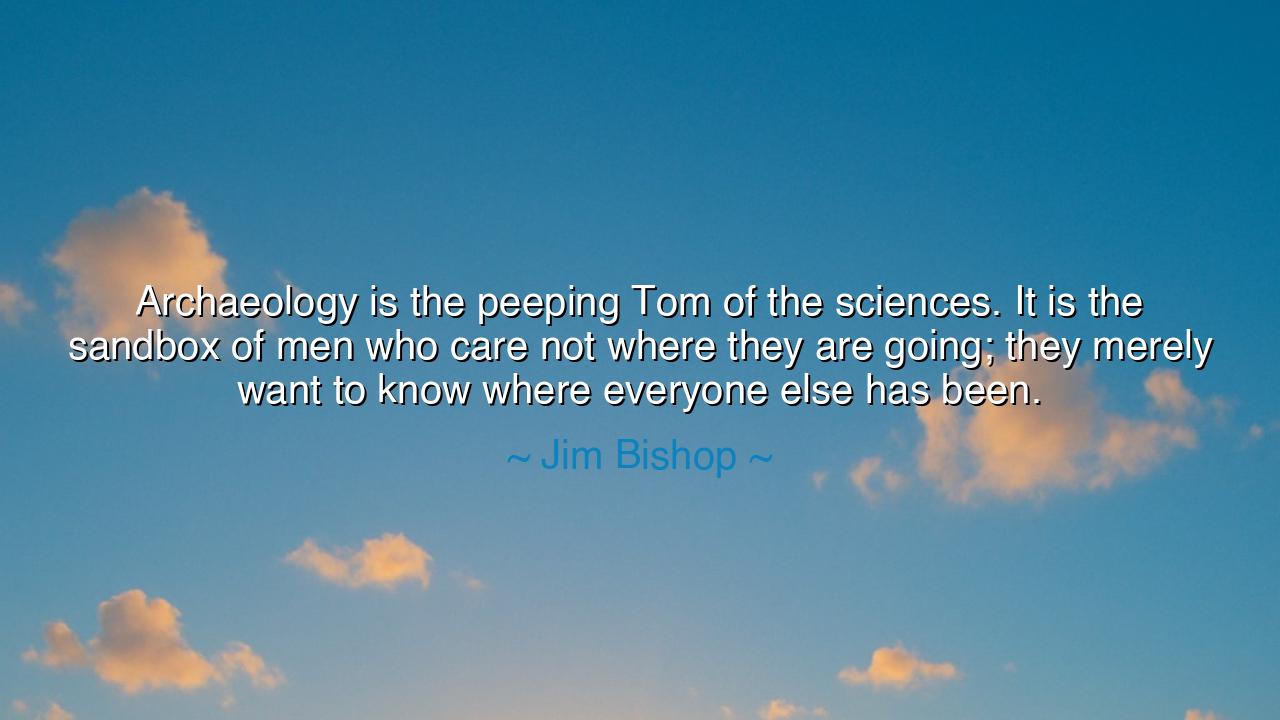
Archaeology is the peeping Tom of the sciences. It is the sandbox
Archaeology is the peeping Tom of the sciences. It is the sandbox of men who care not where they are going; they merely want to know where everyone else has been.






Hear the words of Jim Bishop, sharp with irony and yet rich with truth: “Archaeology is the peeping Tom of the sciences. It is the sandbox of men who care not where they are going; they merely want to know where everyone else has been.” In this saying, the tone is playful, yet beneath the jest lies a profound reflection on humanity’s endless fascination with the past. For archaeology, unlike other sciences that reach toward the future, bends its gaze backward, uncovering what has been lost, what has been buried, what has been forgotten.
The origin of this quote is found in Bishop’s witty commentary on human behavior and the sciences. He saw that archaeologists, rather than racing toward innovation, instead sift patiently through ashes and stones. To him, this was akin to voyeurism: the secret peering into the lives of those long gone, a desire to know their stories without their consent. By calling archaeology a sandbox, he evokes the childlike play of digging, building, and imagining. Yet, within the jest is acknowledgment of something sacred: the yearning not to lose the thread of our own story.
Consider, O listener, the tale of the city of Pompeii. For centuries it lay silent beneath the ash of Vesuvius, its people frozen in their final moments. When archaeologists uncovered it, they did not invent new futures; they revealed old truths. They saw how Romans cooked their bread, painted their walls, and even how they died in terror. Was this not, in Bishop’s words, a kind of “peeping”? And yet, from this looking back, humanity learned more about its resilience, its fragility, and its kinship across the ages. The sandbox became a mirror, showing us that we are not so different from those who came before.
History is filled with such revelations. When Howard Carter opened the tomb of Tutankhamun, he disturbed a slumber three thousand years long. Many called it desecration; others called it discovery. To gaze upon the boy-king’s treasures was to glimpse not just gold, but the heartbeat of a civilization that once dreamed, ruled, and prayed beneath the Nile’s sun. Here again, Bishop’s irony applies: the archaeologist is not a prophet of where we go, but a witness of where they have been. And yet, is not this knowledge a compass of its own, reminding us of the fate of kingdoms, the vanity of riches, the mortality of kings?
The emotional power of Bishop’s words is found in the tension between mockery and reverence. To call archaeology a peeping Tom diminishes it, as though it were idle curiosity. But to reflect upon it more deeply is to see that this curiosity is not trivial. It is a hunger born of the human soul—a need to connect, to remember, to see oneself in the dust of ages. For though archaeology may not chart the stars of tomorrow, it anchors us in the soil of yesterday, without which the future is rootless.
The lesson for us is clear: while it is noble to look forward, it is also wise to look back. To ignore the past is to stumble blindly into error; to understand it is to walk with caution and with humility. If archaeologists are indeed playing in a sandbox, then it is a sandbox where civilizations rise and fall, where wisdom is hidden among ruins, and where folly is written upon shattered walls. To learn from those who have been is to guard those who are yet to come.
So let each of us become, in some measure, an archaeologist of life. Examine your own past, the mistakes you have buried, the victories you have forgotten. Dig into the ruins of your memory and learn what they have to teach. And when you look upon the relics of history—whether the broken amphora of an ancient people or the faded photographs of your grandparents—do not see mere curiosities. See in them the voices of those who walked before you, whispering guidance, warning, and hope. For though Bishop teases, his words remind us: in knowing where we have been, we find our bearings for where we must go.






AAdministratorAdministrator
Welcome, honored guests. Please leave a comment, we will respond soon